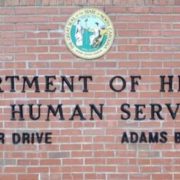It looks like a newspaper box, but the contents of this special vending machine outside the Warren County Memorial Library are life-saving resources to reverse opioid overdoses.
The Warren County Health Department joined the library and other local partners at a ribbon cutting on May 29 to announce the placement of the Naloxone vending machine outside the library.
It’s available 24 hours a day and includes an instructional video as well as risk-reduction supplies such as Naloxone, fentanyl/xylazine testing strips, medication lockboxes and more. Naloxone, also known as Narcan, is the opioid overdose reversal medication that has proven results saving the lives of individuals who have overdosed from opioid drugs, according to information from Warren County officials.
Guest speakers included Warren County Health Director Dr. Margaret Brake, Library Director Tanika Alston and Emergency Services Director Chris Tucker.
In her remarks, Alston stated, “We are excited to be part of this initiative aimed at preventing overdose deaths and creating a healthier community for everyone.”
The health department’s Health Educator Brittley Harris highlighted the supplies displayed in vending machine and described their use.
Supporting partners participating in the ceremony included representatives from Warren County Government, Emergency Medical Services, Sheriff’s Office, Detention Center, Parks & Recreation, Trillium Health Resources and Wilson County Substance Prevention Coalition.
In addition, the Health Department also provides the ONEbox™ emergency overdose reversal kits containing two doses of the opioid reversal medication, Naloxone, to local organizations, businesses, churches and county government offices. This will enable anyone in those places to administer naloxone quickly and safely to a person overdosing in an effort to save their life. If your business, church or organization is interested in receiving the ONEbox™, please call 252. 257.6017.
Health Department staff also provide training on how to use the kit.
ONEbox™ (Opioid Naloxone Emergency Box) is a self-contained, video-enabled opioid overdose reversal kit intended to contain two doses of the opioid reversal medication Naloxone, along with personal protective equipment and video instruction (in English and Spanish) that are activated when ONEbox™ is opened. ONEbox™ was invented by West Virginia native and entrepreneur Joe Murphy, who created the box after seeing the devastation the opioid crisis caused in his hometown community in Huntington, West Virginia.
Both the free vending machine supplies and the ONEbox™ are available to the community thanks to a grant partnership with Wilson County Substance Prevention Coalition.
Brake said, “We are pleased that our local partners support Naloxone training and access for populations most at-risk for overdose. We also recognize the importance of having access to the right tools at the right time to help in preventing an overdose. Awareness has never been more critical.”
Tucker noted that, “anyone is susceptible to overdose, not just those individuals experiencing addiction to drugs. Deaths from overdose are preventable through the timely administration of Naloxone/Narcan and appropriate response to overdose situations.”
Anyone interested in receiving free training on Overdose Prevention, Naloxone/Narcan administration and Hands-Only CPR can attend a two-hour training on Tuesday, June 24 at the Warren County Emergency Services Building. Please contact Chris Tucker 252.257.1191 or Rhonda Mushaw 252.257.6012 for more information and to register. Naloxone/Narcan will be available to those individuals who participate in the training.




